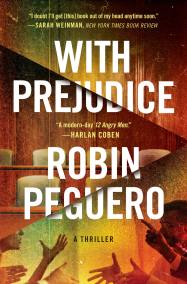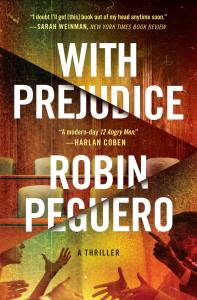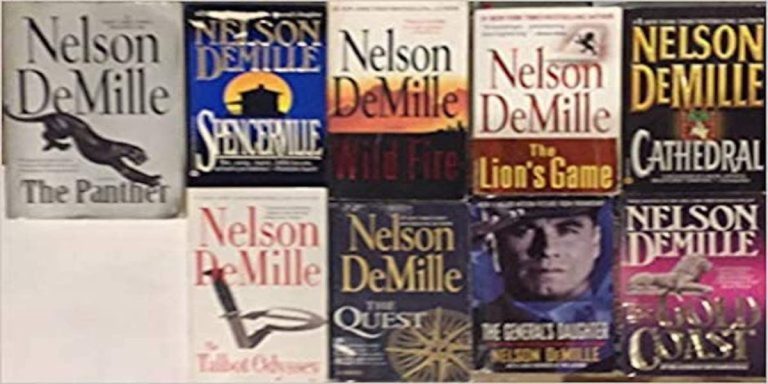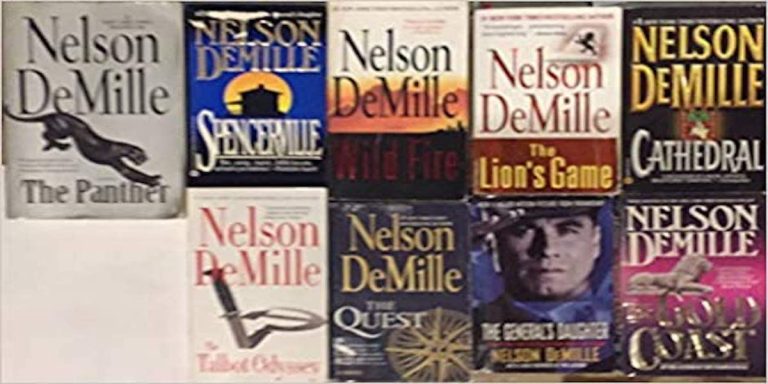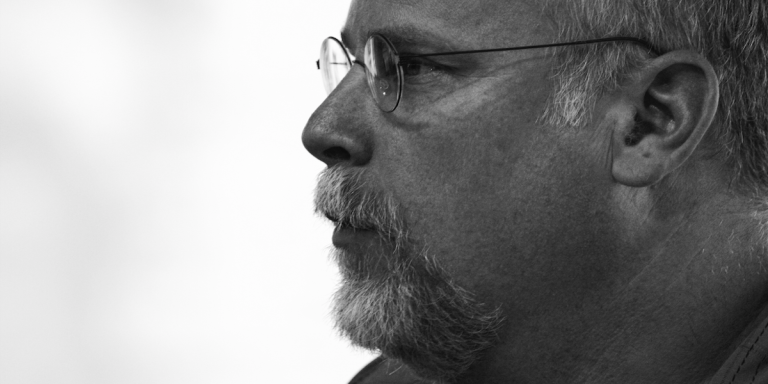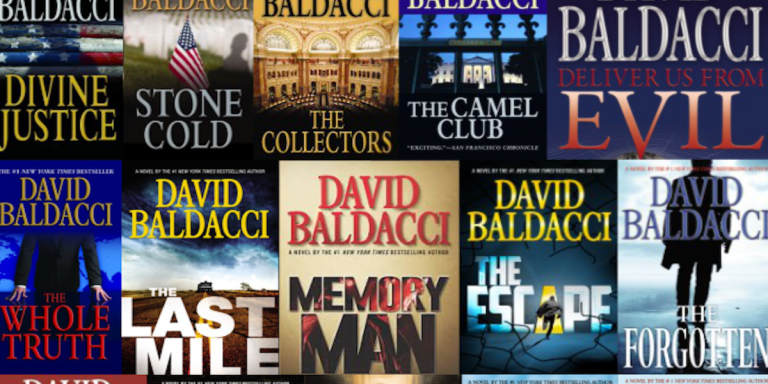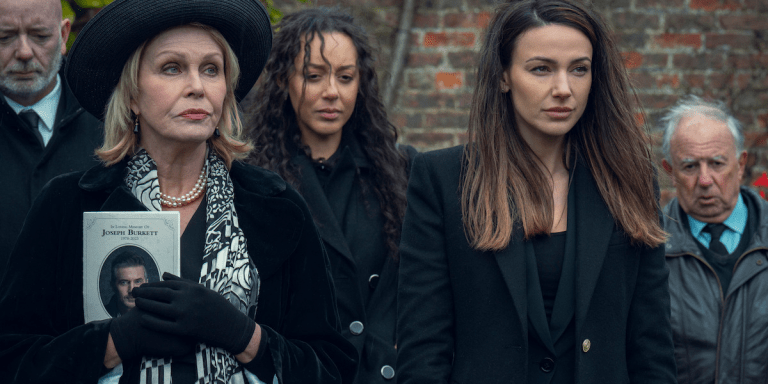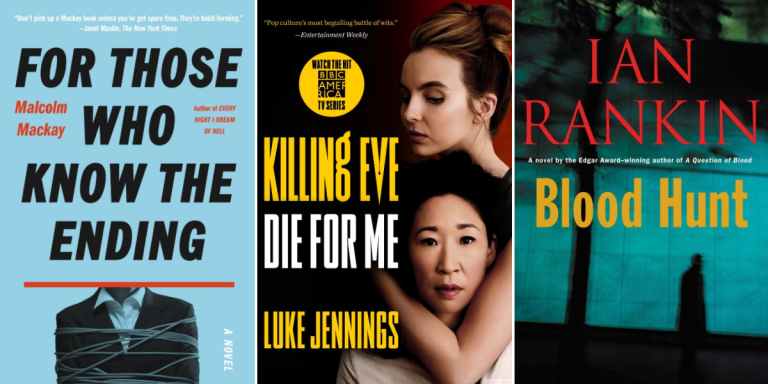Read the Excerpt: With Prejudice by Robin Peguero
00 | GETTING TO SEVEN
The five men and two women of the jury sat in silence. The air-conditioning rattled and hummed, blowing frigid air their way. Juror number eight hugged herself. The soundtrack from the city below—wailing sirens, honking horns, and screeching tires—floated in past a closed window. Juror number one added to the cacophony by rapping his fingers against the top of the oblong, mahogany table that swallowed the space with its grandeur. Carved onto its side, within eyesight of only juror number sixteen, were the words “Set me free.” He fingered the grooves with his thumb.
“What do you do?” juror number one asked juror number three. The speaker was white, in his fifties, and portly. He smiled broadly and nodded compulsively as others spoke, whether he agreed with them or not.
“I’m a tax collector,” said number three. The responder was black, of the same age, but heavier in build. He sat with his arms resting on the rolls of fat collecting at his stomach. He wore tiny glasses that all but disappeared on the enormity of his round face.
“Wow,” said number one with a chortle. “You’re hated as much as defense attorneys.”
Number three raised his eyebrows curiously.
“Or, depending on your politics, as much as prosecutors.”
Number one cut his laughter short. Discomfort flashed noticeably in his eyes. But he smiled through it and bobbed his head in polite agreement.
The strangers eventually ran out of meaningless things to say. The sound of the long hand on the outdated clock on the wall rifled through the air, a click every minute. The seconds between—at first, a breezy sixty—grew longer as time and patience wore thin.
“We all know he’s guilty.”
The declaration came from juror number six, loud enough to carry to all of the room’s occupants. A significant number of them shuffled uneasily in their seats.
“The judge instructed us not to talk about the case yet,” number three shot back.
Defensively, number six looked down at her rose-painted fingernails. “I’m just trying to save us time. Get us home at a reasonable hour. If we can get a feel for where we’re at now, we can shorten our deliberation time.”
Juror number eight extended her right hand to number six—shoulders now sagging, chest deflated—and laid it over her forearm. The fingers were chilled, but the gesture was warm. Number eight had a daughter of similar age.
“She was just trying to help,” number eight said, tight-lipped, her eyes locked with the girl’s. “It wouldn’t hurt to get an early count.”
Juror number seventeen cleared his throat. He was a lawyer, a fact he had mentioned several times. His conspicuous cough redirected their attention. He answered with self-effacing diligence. “Before we begin deliberations in earnest, the judge will ask us to elect a foreperson. We can just do that now and save time that way.”
No one dared make eye contact with him again, lest he take it as an indication that he ought to nominate himself. Instead, most eyes moved to number one: the oldest, for one; a man, and a white, old man at that. Even the progressives in the room tapped into muscle memory, turning instinctively for leadership to the one who most looked the part.
Number one smiled, acknowledging the vote of confidence. But his grin soon faded as anxiety took root.
“I don’t know,” he stammered.
He looked to the side. “How about my friend over here?” he said, placing a plump hand on the shoulder of number three. “He’s awfully professional.”
Number three’s eyes softened behind their spectacles. The compliment was both surprising and flattering.
“And I think it would look better.”
The sharp but fleeting pain of a microaggression sliced through the black man like lightning. His heart rate accelerated, his breathing came short and staccato, and the hairs on his arms stood at attention. But seconds later, his vitals returned to stasis. He said nothing. It was forgotten.
A wave of nods surged down the table. By murmured assent, number three became the black face of the jury.
* * *
Earl Thomas bought his first car at age twenty-eight. It was foreign. Its black steel gleamed in the South Florida sun. That was by design. Earl washed it just about every day. He had kept his focus trained in high school, his nose buried in boring books filled with technobabble in college, and his head down thereafter as he inconspicuously ascended the ladder at his nondescript job working for nondescript bosses. All for that car. He loved that car. It was his status symbol.
Ten thousand miles later, he kept it pristine. It looked just like new.
Officer Lance Hollister noticed.
He flipped on the blues and reds, triggering their accompanying wail. Unsurprising to Earl, but nonetheless startling. The routine was frequent enough that he ought to have grown used to it. But he never did. The same physiological response of the heart, lungs, and nerves in a fritz seized him. It made him seem nervous, and therefore suspicious, which in turn escalated his nerves and aura of suspicion.
Officer Hollister lingered in his car. A favorite song of his was a minute from ending on the radio. He was pre-filling tickets: one for no seat belt, the other for a malfunctioning taillight. He had initiated this streetside confrontation, but he, too, felt tightness in his chest, his overworked vital organs reeling with adrenaline.
The slow walk to the suspect’s window—punctuated by the deliberate beat of boot on asphalt—marked a tense countdown. The early seconds of the interaction set the tone. Earl had no way of knowing which side of the heavy hand of the law would greet him: the rough, calloused back hand or the smooth, soft palm. Officer Hollister was similarly at an informational deficit. He spent the walk, and indeed the whole of his working day, wondering if he was marching to his death.
Officer Hollister fingered his gun compulsively. Earl caught sight of the tic in his side-view.
“Do you know why I pulled you over?”
The question was not condescending. It was strategy. An answer might include crimes unknown to the patrolman. I’m sorry, Officer. I know my license is suspended. Or, There’s only a baggie of weed in the center console. Nothing more. Better yet, the officer gets to quote the admission in his report as a so-called spontaneous statement. Merely delete mention of the opening inquiry. No Miranda rights necessary; admissible at trial.
Earl had a caustic answer at the ready, one he was prepared but failed to bury deep in his belly: “Not an earthly clue, sir.” The words discharged from his lips with unexpected defiance. Even as his grip trembled on the steering wheel, Earl’s voice took on a steely resolve.
Officer Hollister whipped back as if physically struck. He grew visibly annoyed.
“Get out of the car, son.”
Earl sneered, sucking at his teeth in disbelief. Noisily, he unfastened his belt, flipped up the lock, and swung open his car door. The imposition was aggravating, but not more than being called “son.” At twenty-five and fresh-faced, Officer Hollister was three years his junior and looked it.
“Up against the car.”
Earl turned grudgingly in a half circle, laying the side of his face and the front of his pressed suit against hot metal. Officer Hollister dug his elbow painfully into his upper back.
“Spread your legs.”
Earl obeyed. Methodically, the officer patted him down, sliding his hands haltingly along the outline of his body. Passersby in cars and on foot slowed down to peer at the suspect—all white faces and rapt, wide eyes. I wonder what that man did. His eyes locked with theirs. It was humiliating.
Turning up nothing, the officer flipped him by the shoulder, bringing their faces inches apart.
“You don’t have any weapons or drugs in your car, do you?”
Ever so slightly, subtle enough to go unperceived, the defeated man shook his head in the wind.
“You’d have no problem letting me search, then?”
Earl found his voice.
“Are you asking for my consent?”
“Are you making me ask for your consent?”
With a tight, pained smile, Earl relented. “No.”
He watched from the curb as the officer rifled through his car. He snapped open the glove compartment. He popped open the trunk. He had Earl input the combination to his briefcase—09, 11, 47—to find nothing but papers with equations and numbers scrawled on them. Satisfied, or perhaps ultimately not, the officer culminated the affair forty-eight minutes after it began by handing Earl the two previously filled tickets.
“False alarm,” Officer Hollister explained. “But inconvenience is a small price to pay for safety. You understand.”
Earl’s silence was intentional. He inspected the two citations.
“Have a good evening, son.”
Officer Hollister walked away, past Earl’s car and halfway to his own, but the suspect’s final quip cut him short, midstride. Earl had finished reading his tickets.
“What’s wrong with my taillight?”
The officer gritted his teeth. His muscles tensed. He turned and walked back. Upon reaching the trunk of Earl’s car, he paused, drew his baton from his belt, and—in one swift, forceful motion—slammed its black body into the light. It shrieked as it shattered. Red glass rained down onto the pavement.
“It’s busted,” Officer Hollister said, then left.
Earl recounted the experience to his wife later that day with verve and indignation. She waited until he was done to respond.
“It’s always cat and mouse with these white folk. A modern game of master and slave.”
Earl said nothing. He purposely didn’t correct her. He didn’t tell her that Officer Hollister was black.
* * *
Mr. Thomas, the foreperson, tore a blank sheet of paper into sevenths.
“We’ll gauge the temperature of the room, but it’ll have to be by secret ballot, so none of us are influenced one way or the other,” he directed. “Write guilty or not guilty, fold once over, and hand it back.”
Solemnly, they scribbled down another man’s fate. Mr. Thomas collected the slips of paper and tallied the vote, sans pomp or circumstance. Five guilty. Two not.
“Well,” juror number one sang, making eye contact with both Mr. Thomas and juror number eleven. “We have our work cut out for us, don’t we?”
He had directed his words to the panel’s two black jurors.
Number eleven openly sighed, eyes rolled to the ceiling. Mr. Thomas smiled emptily in return.
Number one had been only half right. Mr. Thomas had, in fact, been a guilty vote. It was juror number seventeen, the white lawyer, who represented the second not guilty.
“One of us is the alternate,” number seventeen volunteered. “There can’t be an odd number of us. When it’s actually time to deliberate, they’ll cut one of us loose.”
When Mr. Thomas next spoke, the deep bass of his voice commanded the room’s attention. “I’m a numbers guy,” Mr. Thomas began. “For now, it’s seven. We get to seven, we go home. Let’s get to work.”
Order the Book
Earl Thomas, a straight-laced taxman with his fair share of police encounters, is the begrudging foreperson in a high-stakes trial in Miami. Laura Hurtado-Perez is a physician whose unassuming manner conceals a private pain. Joseph Cole is the founder of his local neighborhood watch, unduly obsessed with the families around him.
Along with four others, these jurors of varying ages and walks of life whose paths would likely never have otherwise crossed must come together to make one of the most important decisions of their lives.
On the night Melina Mora, a free-spirited woman both proud and kind, was murdered, she was seen with a young man of Gabriel Soto’s description. Two strands of her hair were found in his bedroom. Sandy Grunwald, a young prosecutor whose political ambitions depend on securing a conviction, finds herself pitted against Jordan Whipple, a preening public defender armed with a freshly discovered, dynamite piece of evidence on the eve of the trial—if the Honorable Darla Tackett will admit it.
What Sandy, Jordan, and Judge Tackett all know, however, is that the criminal justice system is complicated, and everyone has a story—especially the jury. And it’s their experiences, biases, and beliefs that will ultimately shape the verdict.
By clicking 'Sign Up,' I acknowledge that I have read and agree to Hachette Book Group’s Privacy Policy and Terms of Use
